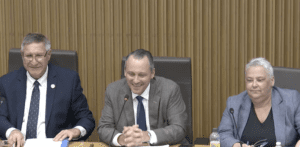Who is a member?
Our members are the local governments of Massachusetts and their elected and appointed leadership.

Senate Ways and Means Chair Michael Rodrigues, left, House Ways and Means Chair Aaron Michlewitz, center, and House Ways and Means Vice Chair Ann-Margaret Ferrante listen to testimony during the annual consensus revenue hearing on Dec. 2 at the State House.
With an ongoing trend of state tax collections falling behind benchmarks — with the exception of Fair Share surtax revenue — fiscal experts concur that the Commonwealth’s fiscal outlook is uncertain for the remainder of this year and for fiscal 2026.
During the annual consensus revenue hearing convened on Dec. 2 by the House and Senate Ways and Means committees and the governor’s budget office, the Department of Revenue and other fiscal experts and economists offered cautious outlooks for the economy and state revenues over the second half of fiscal 2025 and for fiscal 2026.
At the hearing, Department of Revenue Commissioner Geoffrey Snyder reported that year-to-date collections for the current fiscal year totaled approximately $12.51 billion, which is $129 million below benchmark. When year-to-date revenue collections exclude the Fair Share surtax, which can only be used for education and transportation spending, collections are $372 million below the year-to-date benchmark.
The commissioner noted that surtax revenue is outperforming its benchmark, as it did in fiscal 2024, but all other revenue categories are below benchmark targets. When excluding surtax collections, the Department of Revenue is expecting fiscal 2025 to come in at a range of $244 million to $860 million below benchmark.
The fiscal 2025 state budget allocates $1.3 billion in anticipated surtax revenue, but those collections are now forecasted to reach between $2.35 billion and $2.49 billion for the year.
Commissioner Snyder said he expects tax revenue growth in fiscal 2026 of between 1.9% and 3.1%, above the current fiscal 2025 benchmark, not including revenue from the surtax, which is exceeding expectations.
Additional outlooks for next year presented at the consensus revenue hearing were heavily qualified with discussions of uncertainty due to the changing administration at the federal level and related policy implications, such as the potential extension of the state and local tax deduction cap (known as SALT), as well as global conflicts and other geopolitical factors.
The annual revenue hearing marks the start of the state budget season and is important for municipal officials because it provides insights into the direction of the economy and anticipated state revenues available to fund municipal and school aid programs next year, particularly Unrestricted General Government Aid.
Legislative leaders and the administration are expected to reach agreement on a tax revenue forecast for fiscal 2026 in the coming weeks. The forecast will be used in the governor’s budget recommendation, due to be filed by Jan. 22, as well as the House and Senate budget plans that are customarily released in April and May, respectively.